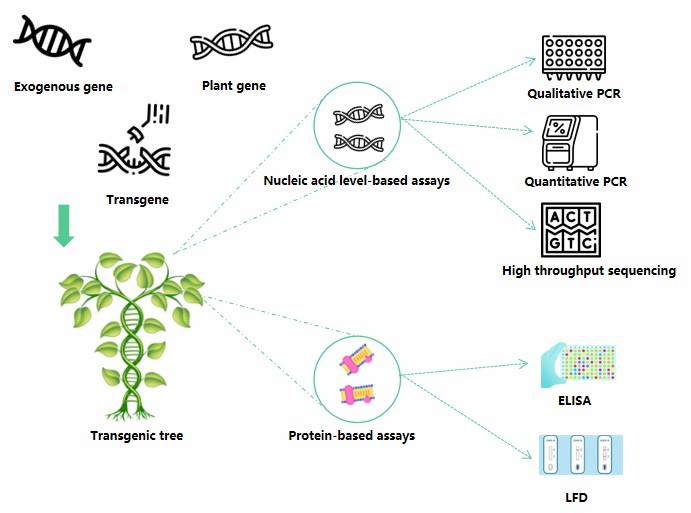Since genetic information transformation technology was applied to plants in the last century, it has broken the original reproductive isolation among natural species, promoted the exchange of different high-quality genes among other species, greatly enriched the types of mutations, and bred a large number of new transgenic forest tree varieties with high growth rate, resistance to pests and diseases, tolerance to herbicides and harsh environment, etc., which have gained great economic and social benefits. The demand for cultivation and commercialization of transgenic forest trees has become the focus of agricultural science and technology attention in various countries.
Although transgenic technology can rapidly and effectively improve the yield, quality, and growth rate of forest trees and has broad application prospects, the biosafety and potential environmental risks of transgenic forest trees themselves have also aroused the concern of scientists. Therefore, transgenic forest trees need to be evaluated for safety, as well as transgenic crops, and transgenic testing technology is the basis and technical guarantee for their research and safety management.
Lifeasible has established a technical platform for transgenic forest tree testing, including testing technology research, standard development, analytical laboratory, and solution consulting services, which can provide our customers with comprehensive and accurate genetically modified forest tree testing services.
The current transgenic detection technologies are mainly nucleic acid-based and exogenous protein target-based detection methods.
This approach can use the PCR method or ring-mediated isothermal amplification technology to design specific primers according to the target gene and marker gene sequences, amplify exogenous gene fragments from transgenic trees, and perform quantitative or qualitative analysis with high detection sensitivity. Or gene chip technology can be used to achieve rapid and efficient detection of tree samples.
We usually use the protein immunoblot hybridization technique or enzyme-linked immunosorbent assay technique for the detection, which can quickly determine whether the genes of transgenic trees are expressed, the concentration and molecular weight size of the expressed exogenous proteins. Or we use protein microarray technology with higher detection sensitivity and accuracy to complete the analysis of forest tree proteins, peptide molecules, enzymes, etc.
 Figure 1. The core approaches for GMO tree analysis.
Figure 1. The core approaches for GMO tree analysis.
Our forest genetic diversity analysis service covers a wide range of common tree species, and the following shows the information on the main forest tree species covered by our company.

Lifeasible has many years of technical precipitation, with professional equipment and a technical team to provide complete technical solutions and professional testing services in forest tree transgenic testing. We strive to be the most experienced technical partner for many research practitioners. If you want to know more about our genetically modified tree testing service, please contact us.